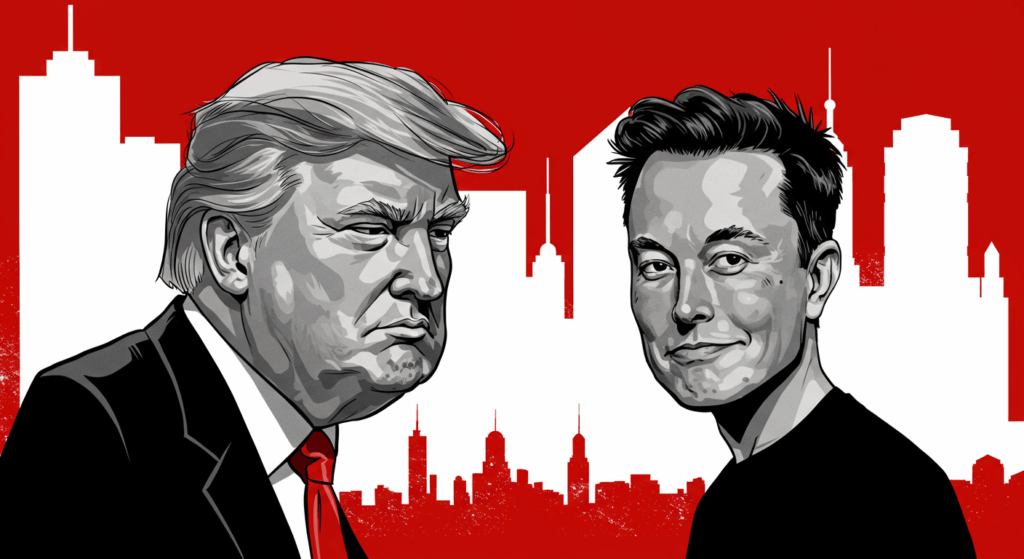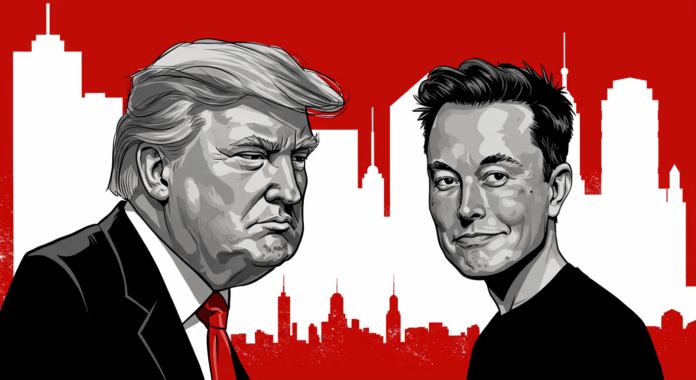
Hey, pause your scrolling. Seriously, stop everything you’re doing and lean in, because what’s brewing between Donald Trump and Elon Musk isn’t just your average political spat. Forget the usual back-and-forth; this is a full-blown, unprecedented clash of titans, a high-stakes drama featuring two of the most unpredictable and influential figures on the planet. And trust me, it’s about to get absolutely wild.
Imagine a scene straight out of a blockbuster movie: One former President, known for his no-holds-barred approach, publicly warns a tech billionaire, a disruptor of industries, about “consequences” if he dares to fund his political rivals. And the billionaire? Instead of retreating, he doubles down, teasing the audacious idea of launching a brand-new political party—the “America Party.” Picture that: a space-faring, electric-car-driving mogul aiming to shake the very foundations of the two-party system.
Sounds like the wildest plot twist Hollywood could conjure, right? But this isn’t fiction. This is the raw, unfiltered reality of American politics in 2025, and it’s poised to become far more interesting, potentially even revolutionary.
What’s Truly Going On Between Trump and Musk? A Saga of Shifting Alliances
Let’s rewind a bit, because the current tension wasn’t an overnight explosion. The relationship between Donald Trump and Elon Musk has always been, to put it mildly, complicated. It’s been a bizarre, on-again, off-again dance, marked by moments of public admiration and sharp, often unexpected, divergences.
Musk, the visionary force behind Tesla, SpaceX, Neuralink, and now the owner of X (formerly Twitter), has often played the enigmatic outsider. He’s a self-proclaimed “free speech absolutist” who has, at times, aligned with certain aspects of Trump’s deregulatory policies, perhaps seeing synergy with his own ambitious, often government-challenging ventures. There were moments when Musk served on Trump’s advisory councils, offering insights on manufacturing and infrastructure. Yet, he also frequently voiced concerns about climate change, a topic where he and Trump stood on opposite ends of a very wide spectrum. Musk’s support, or lack thereof, has always felt transactional, driven by what he perceives as beneficial for his companies and his grander visions for humanity (like colonizing Mars or solving climate change).
But recently, the delicate balance of this relationship shattered. The tipping point? Musk’s subtle, then increasingly overt, hints that he might throw his considerable financial weight behind Democratic candidates. For a figure like Trump, who demands unwavering loyalty and views any support for opponents as a direct act of betrayal, this was a line crossed. Trump’s response was swift and characteristic: a public, pointed warning, echoing through the halls of power and across social media. His veiled threats of “consequences” weren’t just idle words; they were a calculated move, leveraging his enduring influence within the Republican Party and his vast base of support, reminding Musk of the potential regulatory and public backlash he could face. It was a classic Trumpian counter-punch, designed to instill fear and enforce compliance.
Musk, however, is not one to be easily intimidated. Known for his audacious moves and his almost pathological need to disrupt, his reaction was equally audacious. Instead of backing down, he escalated, transforming a public spat into a political earthquake with the tantalizing suggestion of the “America Party.” It’s a move that immediately shifted the narrative from a personal feud to a potential structural overhaul of American democracy.
The “America Party”: A Maverick’s Gambit or a Game-Changer?
And so, we arrive at the truly eyebrow-raising proposition: Elon Musk’s “America Party.” What does this enigmatic name even signify? Is it a desperate ploy, a billionaire’s ego trip, or a genuine attempt to reshape the political landscape?
Musk, with his massive social media following and a fan base that borders on cult-like, has consistently positioned himself as an innovator, a problem-solver who believes established systems are often broken and in need of radical overhaul. His proposed “America Party” could very well be an extension of this disruptive philosophy. Imagine a political home for the disillusioned, a haven for voters utterly exhausted by the relentless, often tribal, Republican vs. Democrat fight. Think of the millions who feel unrepresented by either extreme, yearning for a pragmatic, results-oriented approach that prioritizes innovation, economic growth, and perhaps a technologically advanced future.
Such a party, presumably, would seek to break the traditional mold. What would it stand for? Speculation runs wild:
- Tech-centric policies: Perhaps a strong emphasis on AI regulation, space exploration funding, sustainable energy initiatives, and digital rights.
- Fiscal conservatism with social liberalism? A blend of libertarian ideals concerning individual freedom and free markets, combined with a progressive stance on certain social issues, or perhaps a completely new framework.
- “Common sense” solutions: Musk often frames his views as rational and logical, appealing to those who feel current politics are driven by emotion and ideology rather than data and efficiency.
But the road for third parties in American politics is notoriously treacherous. History is littered with ambitious attempts that fizzled out, swallowed by the well-oiled machinery of the two major parties. The sheer financial and logistical might required to build a national political infrastructure from scratch is staggering. Can a billionaire’s personal brand and substantial wealth truly overcome these systemic hurdles? And how would such a party define its core ideology beyond the personality of its founder? These are the questions that keep political scientists up at night.
Why This Clash Isn’t Just Celebrity Gossip: The Stakes for American Democracy
This isn’t just another celebrity spat or a fleeting online kerfuffle. This clash between two colossal figures has the potential to fundamentally alter the trajectory of U.S. politics, making it a critical concern for every American.
If Musk genuinely commits to launching and funding a new party, the implications could be profound:
- The Vote Splitter Effect: The most immediate and significant impact would be the potential to splinter the existing voter base. A new party, drawing support from disaffected Republicans, disillusioned Democrats, or even previously apolitical citizens, could fundamentally shift electoral outcomes. Which major party would suffer more? That’s the million-dollar question. It could open the door for a truly minority winner in a three-way race, creating an entirely new dynamic in presidential and congressional elections.
- Redrawing the Political Map: Beyond immediate elections, a viable third party could force a long-term realignment of political ideologies. It might push one or both major parties to adapt, to address issues they currently ignore, or to shift their platforms to reclaim lost voters. This could lead to a less rigid, more fluid political landscape, or, conversely, greater fragmentation and instability.
- The Unchecked Influence of Billionaires: This saga brutally highlights the immense, almost unparalleled, influence that ultra-wealthy individuals like Musk wield in modern politics. Their ability to pour millions into campaigns, launch new media platforms, shape public opinion through direct communication (Musk’s ownership of X gives him an unprecedented megaphone), and even consider creating entirely new political structures raises serious questions about democratic fairness and the equitable distribution of power. Are elections truly democratic if a handful of individuals can swing them with their personal fortunes and platforms?
- Shaping Public Discourse: Beyond direct political action, the very public nature of this feud shapes the national conversation. It fuels cynicism in some, offering a spectacle of power plays, while inspiring hope in others who crave disruption. It underscores how much of our political reality is now mediated by tech moguls and social media platforms.
The Echo Chamber and the Experts: What Are People Saying?
The internet, as expected, is absolutely buzzing, a chaotic symphony of opinions, memes, and impassioned arguments.
- The Enthusiasts: Some see Musk’s idea as a stroke of genius, a much-needed jolt to a stagnant system. “Finally, a third choice!” they exclaim, dreaming of a party free from the perceived corruption and ideological dogma of the old guard. They believe Musk’s unconventional thinking and success in business could translate into effective governance, a refreshing break from career politicians.
- The Skeptics: Others are far more cynical, viewing it as yet another “billionaire flex,” a display of unchecked power where Musk attempts to mold the political system to fit his own agenda, rather than genuinely serving the public good. They worry about a nation governed by whims, or by individuals more interested in self-promotion than genuine public service. “He can’t even fix X, how can he fix America?” is a common refrain.
- The Political Experts: Pundits and political scientists, often grounded in historical precedents, are watching with a mixture of fascination and apprehension. Many express skepticism about the long-term viability of any third party in America’s winner-take-all electoral system, pointing to the numerous well-funded attempts that have ultimately faded into obscurity (think Ross Perot’s strong but ultimately fleeting impact). However, they also acknowledge that figures like Trump and Musk defy conventional political logic. They’re debating whether this feud is merely a theatrical distraction designed to dominate headlines or the nascent tremors of a truly significant, perhaps destabilizing, shift in American political power.
So, What’s Next? Buckle Up, America.
The grand, unpredictable chess match between Donald Trump and Elon Musk is far from over. In fact, it feels like the opening moves of a much longer, more complex game.
Will Musk’s “America Party” manage to defy historical odds and become a real, impactful force, drawing significant support and reshaping the electoral map? Or will it follow the path of many hopeful third parties, ultimately sputtering out, a mere footnote in a history of two-party dominance? Will Trump’s veiled threats of “consequences” manifest into concrete actions, perhaps regulatory challenges or increased public pressure on Musk’s sprawling business empire? Or is this just another headline-grabbing spectacle, a momentary diversion that fades as the news cycle moves on?
One thing is undeniably clear: this political soap opera, featuring two of the most outsized personalities of our time, is poised to keep America — and indeed, the world — on the edge of its seat. The traditional rules of engagement in politics seem to be constantly rewriting themselves, and figures like Trump and Musk are holding the pen.
So, buckle up. The Trump-Musk saga isn’t just about two powerful men; it’s a living, breathing experiment in the future of American democracy. And whatever happens next, it’s going to be nothing short of fascinating.
What do you think? Is Elon Musk’s flirtation with a new political party a breath of fresh air for a frustrated electorate, or simply another audacious billionaire power play? Is this the disruptive innovation American politics desperately needs, or a dangerous precedent for the concentration of influence? Drop your thoughts below—this conversation is just getting started, and your perspective matters.


